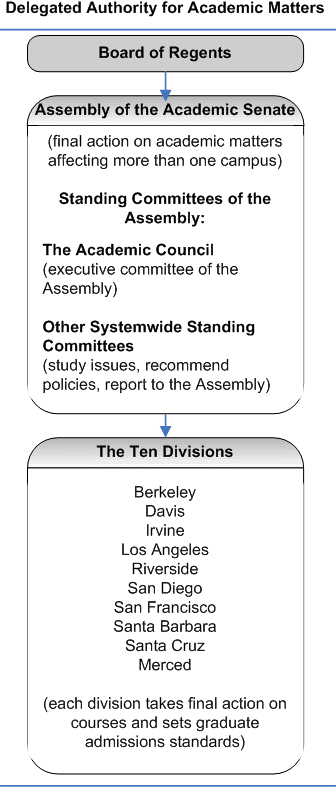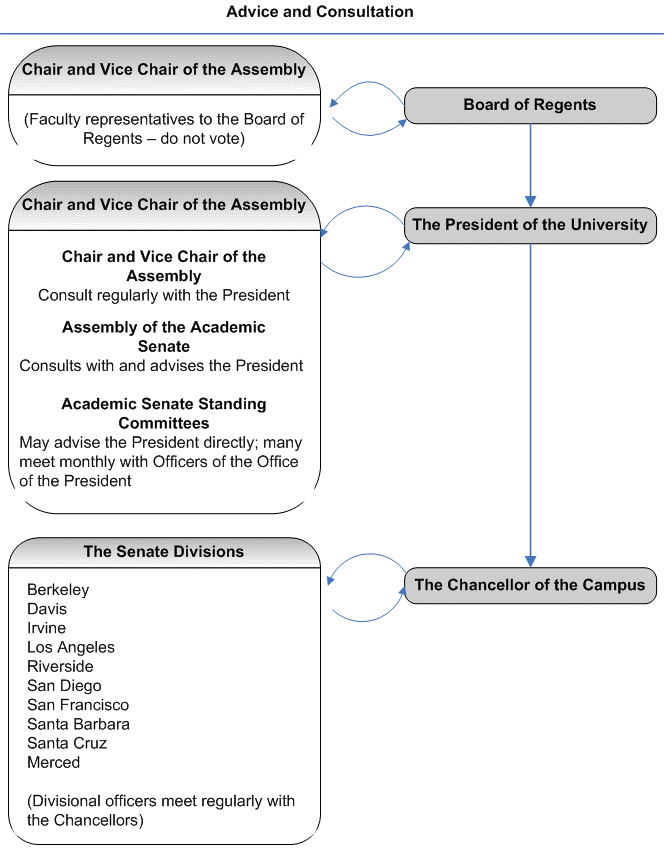Duties and Structure of the Academic Senate
The Academic Senate of the University of California is generally regarded as the most powerful such institution in the country. It is true that on some questions it may be consulted only as a matter of form or not at all, but on other matters, its expressed view may condition, if not control, the answer; and still on others, the senate is the sole judge under delegated authority. The fact that so many of its activities fall into the latter two categories makes it apparently unique among faculty organizations.
-Lynn W. Ely
AAUP Bulletin 1964
Delegated Authority for Academic Matters

Advice and Consultation

The Responsibilities of the Academic Senate:
Two organizational characteristics of the University of California distinguish it from other public and private research universities in the United States. One is the designation of the institution in the state constitution as a public trust, thereby giving the regents an ability to manage the institution relatively free of outside interference. The second is the remarkable power invested in the faculty by the regents, and specifically the Academic Senate, to guide the academic and administrative affairs of the university.
The Academic Senate of the University of California was established with the creation of the university in 1868. Under the Organic Act passed that year as statutory law, the senate and its faculty would act as administrators, instructors and researchers. This model of faculty as both managers and teachers within the university was affirmed when the university was elevated to a "public trust" under the California State Constitution in 1879. At several important junctures in the history of the University of California, the regents reaffirmed and actually strengthened the decisive role of the senate in both the daily management and long-term planning of the institution.
Over time, the institution grew in complexity and a need developed for a professional staff. Today, the senate is empowered by the regents to exercise direct control over academic matters of central importance to the University, and has advisory powers on all issues relating to the mission of the university: instruction, research and public service. In summary, the senate's chief responsibilities are to:
- Authorize, approve, and supervise all courses (except those of certain graduate professional schools).
- Determine the conditions of admissions, certificates and degrees.
- Recommend the hiring and promotion of faculty members.
- Approve the publication of manuscripts by the University of California Press.
- Advise on the administration of the UC libraries.
- Assist in the searches for deans, chancellors, and presidents.
- Advise the university president and the chancellors on budget and administrative matters under the rules of "shared governance."
Shared Governance
The university has developed a dual-track system of authority and responsibility which presumes that faculty members are best qualified to chart the University's educational course, while administrators are most competent to direct its finances and organization. In practice, these domains are overlapping and interdependent. To function successfully together, faculty and administrators depend upon a high degree of consultation, trust, mutual respect, and a tradition of collegiality.
Professional Life
In the professional realm, senate committees address issues as diverse as resource allocation and planning, benefits and working conditions, teaching, diversity, equity and inclusion, research and public service. Every division has a Committee on Privilege and Tenure to which a faculty member may turn if they believe they have a professional grievance. This committee also conducts hearings in cases of disciplinary action by the administration against senate members. In addition, senate divisions allocate grants for research and offer workshops on professional development to faculty members.
Assuring Faculty Quality
The Senate's reputation as one of the world's strongest faculty governments derives in good measure from its crucial role in academic personnel review. In this domain, divisional Senate Committees on Academic Personnel maintain a highly respected merit system which upholds stringent professional and academic standards. CAP conducts confidential peer reviews of every candidate for a faculty position and scrutinizes the records of faculty candidates for advancement. Their review process focuses on academic and professional achievement with special emphasis on proficiency in teaching and productivity in research. CAP works to make sure the process is not affected by outside pressures; they guard against allowing considerations that are unrelated to professional competence. Senate academic personnel committees report their conclusions and recommendations about hiring and promotions to the chancellor, who exercises final authority over campus personnel matters. The chancellor relies on the committee's expertise--and generally follows its advice.
Voice of the Faculty:
The senate, through its committees and its leaders, is the voice of the faculty and a major conduit for faculty initiatives. Each division communicates formally through committee reports, legislative actions, and resolutions. Extensive informal channels of communication exist as well, through contacts with campus and systemwide administrators. Division chairs and chancellors, for example, often confer with one another about issues affecting their campuses. Informal lines of communication are strong between statewide administrators and Academic Council leaders as well. Senate leaders serve on administrative committees and advisory boards. Administrators attend senate committee meetings to exchange information and hear debate. Information sharing extends to the highest level of the university, where the chair and vice chair of the Academic Council are the official faculty representatives to the Board of Regents, positions through which they participate in the discussions at the board's monthly meetings, make faculty views known, and relay regental actions and concerns back to the senate.
Senate Service:
Faculty members serve the senate on a voluntary basis. They come to this work on each campus through appointment by the divisional Committee on Committees and confirmation by the division as a whole. At the university-wide level, the University Committee on Committees makes the appointments. Representatives to the assembly and to campus legislative bodies are either appointed or elected, depending on campus practices. Many senate committees include student representatives nominated by the student government.
The Systemwide Academic Senate:
The senate is a federation of campus "divisions" that ultimately reports to the Systemwide Assembly of the Academic Senate. This is a representational body with members from each Division that meets approximately three times a year. In turn, the Assembly and its officers report directly to the university president, who then reports to the Board of Regents. Hence, the senate is not under the authority of campus chancellors or other administrators besides the president. The systemwide organization also includes the following:
- The Academic Council: the Council acts as the executive committee of the assembly, and includes the chairs of each division, the chairs of key systemwide senate committees (such as the Board on Admissions and Relations with Schools and the University Committee on Academic Personnel), and includes a Chair and Vice Chair. The chair manages the affairs of the Systemwide Senate, and also sits as an ex-officio and non-voting member of the Board of Regents.
- Standing and Special Committees: a total of eighteen committees including, in addition to those mentioned above, the university committees on:
- Faculty Welfare
- Graduate Affairs
- Planning and Budget
- Educational Policy
- Diversity, Equity and Inclusion
- Privilege and Tenure
- UC Press Editorial Board
- Education Abroad Program
- Rules and Jurisdiction
- Committee on Committees
- Divisions of the Academic Senate: each campus has a division with either a Faculty Legislature (consisting of representatives from the various departments), or an assembly structure which extends voting privileges to all senate members on the campus. Each division then has its own set of committees that mirror, to some extent, those at the systemwide level.